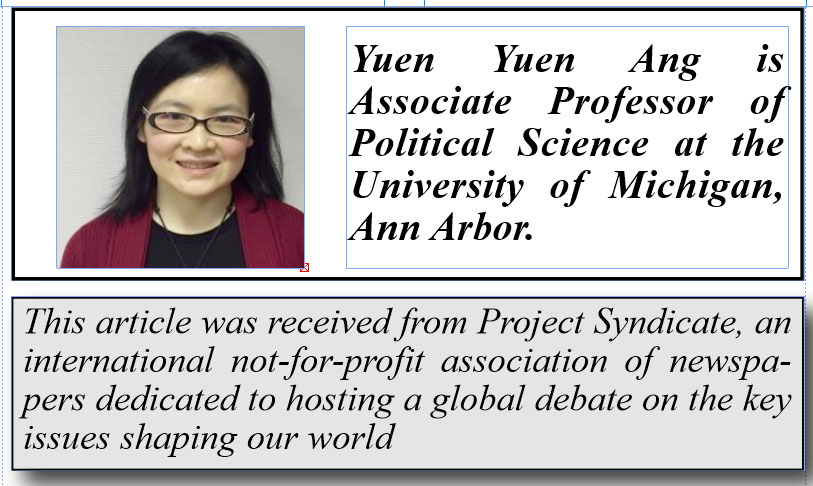ANN ARBOR – Since Chinese President Xi Jinping launched his sweeping anti-corruption campaign in 2012, more than 1.5 million officials, including some of the Communist Party of China’s (CPC) top leaders, have been disciplined. Among them is Ji Jianye, the former leader of Nanjing and Yangzhou, in Jiangsu Province. Disgraced, Ji is now remembered only for his bribes and scandals. Yet, prior to his downfall, he was famous for his iron-fisted competence. “In Yangzhou,” reads one local media report in Southern Weekend, “most people agree that Ji is the leader who has made the greatest contributions to the city since 1949.”
Portrayals of China’s political system are sharply divided. One camp describes China as a Confucian-style meritocracy where officials are selected, as Daniel A. Bell of Shandong University puts it, “in accordance with ability and virtue” through a top-down process, rather than by elections. According to Bell, meritocracy presents an alternative – even a challenge – to democracy. He recommends that the Chinese government export this model abroad.
The second camp comprises naysayers such as Minxin Pei of Claremont McKenna College and author Gordon G. Chang, who have insisted for decades that the CPC is decaying from corruption and will soon collapse. In dire terms, Pei describes the regime as filled with “looting, debauchery, and utter lawlessness.”
In fact, neither view is correct. Corruption and competence do not just coexist within China’s political system; they can be mutually reinforcing. Ji is a case in point. Through massive demolition and urban-renewal projects, he rapidly transformed Yangzhou into an award-winning tourist destination, and over the course of his career has earned the nickname “Mayor Bulldozer.” Under his leadership, the city’s GDP surpassed the provincial average for the first time ever.
Meanwhile, Ji’s long-time cronies made a fortune during his tenure. In exchange for lavish gifts, bribes, and company shares, Ji awarded their businesses near-monopoly access to government construction and renovation projects. One of these companies, Gold Mantis, saw its profits grow fifteen-fold in just six years. The more Ji pushed for growth, the more spoils he produced.
This paradox is not limited to Ji. In a forthcoming book, China’s Gilded Age, my study of 331 CPC city-level secretaries’ careers, I find that 40% of those who have fallen to corruption charges were promoted within five years, or even just a few months prior to, their downfall.
To be sure, champions of Chinese meritocracy, like venture capitalist Eric X. Li, acknowledge the existence of patronage and corruption, but argue that “merit remains the fundamental driver.” Yet corruption is more of a feature of the system than a bug. This should come as no surprise. The CPC controls valuable resources – from land and financing to procurement contracts – and individual CPC leaders can and do command immense personal power. Hence, CPC leaders find themselves constantly inundated with requests for favours, many of which are accompanied by graft.
Moreover, any political meritocracy faces the problem of who should guard the guardians. Li describes the Party’s appointment-making body, the Organization Department, as a “human resources engine that would be the envy of some of the most successful corporations.” Yet, if anything, this office is even more corruptible than others, precisely because it controls appointments and promotions. Lo and behold, in 2018, 68 officials at the Central Organization Department were punished for corruption.
Naysayers, meanwhile, err in the opposite direction, magnifying stories of Chinese corruption while ignoring corrupt officials’ effectiveness in promoting growth and delivering social welfare. Bo Xilai, the former Party boss of Chongqing who was dramatically ousted in 2012, is the most striking example. Although he flagrantly abused his power, Bo turned around his landlocked municipality’s fortunes, and delivered public goods and affordable housing to tens of millions of poor residents.
What both camps fail to grasp is the symbiotic relationship between corruption and performance in China’s fiercely competitive political system. For political elites whose formal pay is low, cronyism not only finances lavish consumption but also helps advance their careers. Wealthy cronies donate to public works, mobilize business networks to invest in state construction schemes, and help politicians complete their signature projects, which improve both a city’s physical image and the leader’s track record.
Like a supersized game of Whac-A-Mole, Xi’s crusade against corruption has netted a staggering number of officials, and is still ongoing. But the campaign ignores a crucial reality: politicians’ performance is dependent on sponsorships from corporate cronies and political patronage. Nor has the spate of arrests reduced the power of the state over the economy, which is the root cause of corruption. On the contrary, Xi has ratcheted up state intervention to a level not seen in years.
Paradoxes define China’s political economy. China is ruled by a communist party yet it is capitalist. The regime has a meritocracy yet it is also corrupt. Understanding China requires that we grasp such seeming contradictions, which will persist well into the next decade.
Yuen Yuen Ang is Associate Professor of Political Science at the University of Michigan, Ann Arbor.
Copyright: Project Syndicate, 2019.





